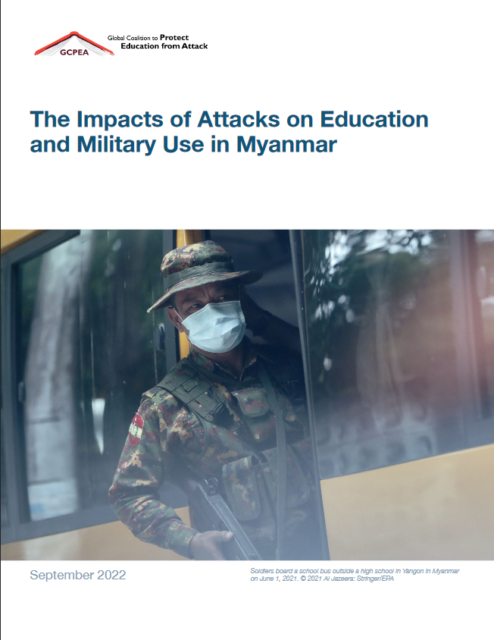The impacts of attacks on education and military use in Myanmar

Summary
In 2020 and 2021, the Global Coalition to Protect Education from Attack (GCPEA) identified over 450 reported attacks on education and incidents of military use of schools, universities, and educational facilities in Myanmar by state armed forces and non-state armed groups, the majority of which occurred after the military takeover on February 1, 2021.
Reported attacks on schools increased from approximately 10 in 2020 to around 190 in 2021, an increase of approximately 1,800 percent. Furthermore, GCPEA found that attacks on schools spread from at least three to 13 states and regions in Myanmar following the military takeover, with a peak in May 2021, and often involved the use of explosive weapons with wide-area effects.
Military use of schools and universities was also pervasive in Myanmar and further threatened the safety and security of education. Military use alone can have grave consequences for education, since armed forces and armed groups often damage schools or universities while using them as a base or for other military purposes, and their presence places students and educators still attending the institutions at risk. Worth noting, however, is that military use can also provoke rival forces or armed groups to target the educational facility, yet further risking lives and damage. Military use may turn schools and universities into military objectives, rendering them lawful targets of attack during armed conflict. In the data collected, GCPEA found that over a quarter of schools and universities used for military purposes in 2021 were subsequently targeted by rival forces or armed groups.
The widespread targeted attacks on, and military use of, schools, universities, and education infrastructure in Myanmar has created a hostile educational context for students, parents, and educators, who have found it increasingly challenging to make safe choices with regards to their learning, their children, and their jobs. GCPEA remains concerned about both the short and long-term consequences of this severe learning interruption and its broader implications for teaching and learning, from pre-primary through higher education.
Key recommendations
- Armed actors should protect the civilian character of schools and universities and cease attacks and threats of attacks against students, teachers, academics, and educational facilities.
- Armed actors should refrain from using schools and universities for military purposes, including by implementing the Guidelines for Protecting Schools and Universities from Military Use during Armed Conflict.
- Non-state armed groups should sign and implement Geneva Call’s Deed of Commitment for the Protection of Children from the Effects of Armed Conflict, including as it relates to educational spaces.
- Armed actors should allow access for humanitarian actors delivering education to the most vulnerable children.
- Armed actors should refrain from politicizing education, and safeguard access to all levels of education.
- States and international justice mechanisms should support efforts to hold perpetrators of attacks on education accountable in impartial and independent courts.
- Education providers, humanitarian and development agencies, and donors should commit to supporting communities and local organizations to facilitate flexible ways to continue education.


